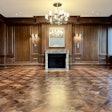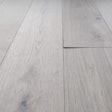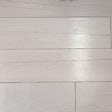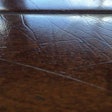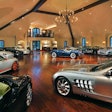Recently Jim Decker left a question on one of my blog posts: "How long can an engineered floor be subjected to low RH or high RH and not be affected?"
Jim, thanks for the setup for an interesting topic. But first some background.
When plywood panels were first proposed as a substitute for solid lumber, the major concern by the end user was whether or not plywood would function as well solids over the long term. After all, wood frame buildings can last hundreds of years under normal conditions. There were also some very interesting economic issues surrounding plywood in addition to the technical ones.
Technical Issues:There were and are concerns about the strength and durability of the adhesive and wood components of engineered wood products. And engineered wood products are technologically advanced, requiring specialized machinery and staff with additional knowledge and skills.
Think about the result if structural plywood (the original "engineered" wood) could not stand up to extremes of high and low RH and the range of conditions that are present in a wood frame building that can potentially put a great deal of stress caused by changes in moisture content related to wildly varying conditions. Without a doubt, plywood used as roof sheathing experiences the most severe service conditions. During a sunny day roof temperatures can reach 140 degrees F and then return to under 70 degrees F at night and do this on a daily basis, day after day after day. And this is after the plywood is exposed to rain, snow and ice during rough framing when it is initially installed and exposed to the outdoors. Manufacturers of plywood use adhesives and manufacturing quality control procedures to ensure that these panels can maintain their structural integrity for the service life of the building, including the abuse associated with the rough framing and exposure to all manner of bad weather.
Economic Issues:It takes more money to become a veneer and plywood manufacturer versus running a sawmill and planer mill. The equipment to make veneers and assemble plywood are more costly, and the larger production capacity requires a greater quantity of raw materials. The specialized machinery can't be used to make other products, and more highly developed marketing and distribution departments are required, at great expense. These significantly greater financial and organizational obstacles to starting and operating a plywood company limit the potential number of participants. Compared with making plywood, converting timber into boards can be efficiently managed on a much smaller scale at a much lower initial investment. Also, the machines used to make solid wood products can often be easily adapted to manufacture a wide spectrum of marketable products. Large companies have the financial resources to build the plants and get a quality finished product delivered to the marketplace. Less competition allows greater profits.
So what does this have to do with "engineered" wood flooring, and "How long can an engineered floor be subjected to low RH or high RH and not be affected?" End users expect that part of the deal with any "engineered" wood product is that there will be some advantages and that the products will not fall apart. Let's face the cold hard truth and concede that falling apart and delaminating are the same thing. Will high and low RH affect engineered wood floors? Of course they will. Depending on a number of factors, normal results from extreme RH could include shrinking, swelling, checking, and changes in shape (cupping or crowning), but any properly manufactured engineered wood product should not delaminate.
Can individual manufacturers legally require the end user to keep RH between 30% and 50%? Why not? A warranty is a legal contract between the seller and buyer. Legal stuff and technical facts don't always match one another. Please get over it. But here is an idle thought or suggestion: Don't sell engineered wood floors like they are bulletproof and be surprised when someone calls your bluff. Sorry for all of the clichés.



















